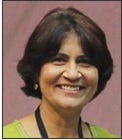Carvell Wallace on KQED Forum
A few weeks ago, I happened to hear a live snippet of the “KQED Forum” radio program on NPR featuring a conversation with the writer, Carvell Wallace. While I was not familiar with his work, what I heard resonated so much with me that I downloaded the podcast and have listened to it several times. I found it not only profoundly moving but also deeply inspiring for anyone who appreciates the power of writing and aspires to create it. As the host of the program, Alexis Madrigal put it, “[Carvell Wallace] can take any raw material and write something immersive, propulsive, and deeply honest.”
The occasion for Carvell coming to the show was that he had just won a major journalism award, the American Mosaic Journalism prize from the Heising-Simons Foundation. While he has been actively writing for close to a decade now — about race, arts, culture, film and music for leading magazines; he is especially well known for his celebrity profiles — what has brought him the most acclaim recently is a personal essay on abortion that he self-published in Medium. He wrote this essay in the aftermath of the Supreme Court’s decision to overturn Roe v Wade and the subsequent restrictions on abortion access that are being put in place in a growing number of states.
In this essay, he takes the question that pro-lifers often ask those who are pro-choice — “If your mother had an abortion, then you wouldn’t be here!” — and turns it around by countering, “If my mother had an abortion, maybe she would still be here.” His mother died in 2008, when she was only 54 years old. She had had a very difficult life following her pregnancy, which happened when she was barely out of high school. And while she didn’t get an abortion at that time — it was 1974, and abortion had just been legalized, but it was still very hard to come by — she never really got a chance to explore life and living without shouldering the responsibilities of being a mother at such a young age. So yes, Carvell was indeed alive now because his mother didn’t have an abortion — but what might his mother’s life have been like if she had?
Not only is the essay so powerful and poignant (he read an excerpt on the show, and the essay in full can be read here), what was amazing to me is how anyone can even contemplate their own non-existence. We are all so much “here” that it seems to be impossible to imagine not being here, not just being dead but not even being born. If the ultimate goal of enlightenment is self-transcendence, this would seem to be it.
While I would have loved to reproduce the entire transcript of this KQED Forum episode here if I could — it is that good — here are some other snippets from the conversation that stood out for me. Carvell sees doing service work not as something we should do to make ourselves feel good, but rather, as a “rent” of sorts for being on this earth and consuming its resources, for being part of a society from which we enjoy benefits that we have been lucky to get. We each have a responsibility to alleviate the suffering of others that have not been so lucky through no fault of their own.
On his part, he is constantly asking himself what he is going to do with his time here on earth, what is it that he can offer to help those are less fortunate. It is this that gives him the sense of purpose that he needs to live every day. (He especially needs this now that his kids are older and don’t need the constant parenting kids need when they are little.) Carvell also talked candidly about his tendency to depression, which makes it critical for him to feel purposeful every day.
In his case, it is writing that gives him the purpose he needs. He sees his writing as the ability to articulate a feeling that someone has deep inside of them that they haven’t been able to find the words for, and all he does is take this “little craft” with him as he goes from place to place. His writing might appeal to some people while others might take issue with it, but this is what he has the talent for, and this is therefore what he does. I found this low-key, no-fuss approach to writing very refreshing — if you have a talent for it, you just do it without thinking that you are doing something so great.
One other snippet from the program that stuck out for me was when a caller who had called in to share his thoughts said, among other things, that when his little daughter had asked him why people had to die, he told her it was so that other people could have a chance to live too. Carvell called this the best answer he has ever heard to the question of why we die and complimented the caller on his stellar parenting. I was blown away by this answer as well, and I find it heart-warming to come across nuggets of wisdom like this in the course of my everyday life.
A special shout-out to the host of the show, Alexis Madrigal. I find him always very good in interviewing the guests who come on KQED Forum, but his conversation with Carvell — whose work he has been following for a long time — was exceptional. It brought out the depths in Carvell’s personality that even those who are familiar with his work may not be aware of. I, for one, was glad to have learned about him.
Here is the link to the show: https://www.kqed.org/forum/2010101892419/in-search-of-love-and-liberation-with-writer-carvell-wallace
